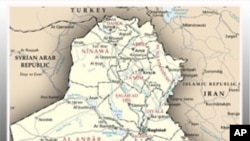A former top British intelligence officer says British officials decided in 2001 against participating in talks with U.S. officials about regime change in Iraq.
Peter Ricketts, now permanent secretary at the Home Office, spoke Tuesday at the opening of a long-awaited public inquiry into Britain's role in the Iraq war.
Ricketts said British officials were aware months before the September 11, 2001 terrorist attacks on the United States that the Bush administration was pressing for the removal of Iraqi President Saddam Hussein. He noted the U.S. rhetoric - particularly an article published by then-U.S. National Security Advisor Condoleezza Rice discussing the overthrow of Saddam - but said it did not seem like a draft of an operations plan.
Inquiry chairman John Chilcot opened the hearings with a moment of silence for those killed in the conflict.
His five-member inquiry team expects to question dozens of officials during the year-long inquiry, including former Prime Minister Tony Blair and a host of military officials.
Relatives of the British dead and anti-war protesters have long argued the government used distorted intelligence, including unsubstantiated claims of Iraqi weapons of mass destruction, to justify the invasion.
Two previous British probes into aspects of the Iraq war have been described by critics as lacking in depth.
Inquiry chairman John Chilcot says his investigation will provide a thorough analysis of events leading to the March 2003 U.S.-led invasion. He says the panel is "apolitical and independent" and that proceedings will be held in public as much as possible. A report will be issued in 2010.
Britain deployed 45,000 troops to Iraq in 2003, to participate in the U.S.-led invasion. One hundred-seventy nine British military personnel have been killed.
News
British Official: Secret Iraq War Talks Began in 2001
update

Peter Ricketts says UK officials became aware months before 9/11 terrorist attacks of Bush administration plans to remove Iraqi President Saddam Hussein



